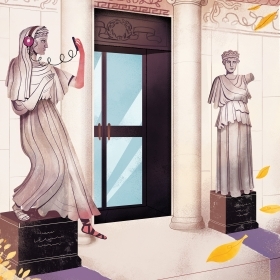One of the defining characteristics of a Wellesley education always has been, and always will be, our identity as a women’s college.
Indeed, nearly all of the alumnae I speak to tell me that being...
One of the defining characteristics of a Wellesley education always has been, and always will be, our identity as a women’s college.
Indeed, nearly all of the alumnae I speak to tell me that being a women’s college is what makes this place so special, and what has made the College have a lasting impact on their lives.
And yet, our surveys show that just 14 percent of entering students choose Wellesley because it is a women’s college. They choose it for many reasons—the dynamic classrooms, the exceptional faculty, the amazing peers, or the generous financial aid, for instance.
What happens here to explain such a change in perception? Part of the explanation is that being a women’s college matters.
Graduates of women’s colleges are more likely to major in math and science, or in economics, than women at coed colleges. Graduates of women’s colleges are almost twice as likely to complete a graduate degree than women from coed institutions. Surveys show that graduates of women’s colleges feel more prepared in their first jobs. Graduates have access to more leadership positions and training than those at coed schools. Graduates report more frequent interaction with their professors than at coed schools.
Only 2 percent of women who attend college attend women’s colleges, yet graduates of women’s colleges represent more than 20 percent of women in Congress, and 33 percent of women on Fortune 1000 boards.
You have only to walk down the hallways of Alumnae Hall, with the photographs of our many accomplished graduates, or spend just a few minutes speaking with any Wellesley alum to know that there is something special about this place that helps propel smart women into the world, well prepared to make a difference.
There are two main factors that explain the marked and significant shift in thinking from our first-year students to our alums. The first is the classroom experience. Anyone who has set foot inside Wellesley classrooms knows that they are rigorous, challenging, intellectual incubators where, as TJ Jarrett ’95 said in an interview in the Atlantic, “you think you’re taking a class in literary theory, but what you’re really learning is to think deeply and systematically.”
Certainly, the same can be said of other very good liberal-arts colleges, but not to the same extent as Wellesley. That’s because our classrooms are of women, for women, and by women. Women comprise more than 50 percent of our faculty, serving as important role models and mentors for students.
The second part of the explanation is the spirit and culture of our campus. It’s the Wellesley magic. Wellesley creates a strong sense of belonging, and a feeling of genuine attachment to this place and to the others who have experienced it. As we sing in The Wellesley Composite, “Wellesley, Wellesley, only to be there.”
The Wellesley magic is strengthened by our longstanding traditions that live on today—Stepsinging, Flower Sunday, Tree Planting, and Hooprolling, to name a few—which help foster strong bonds between students and alumnae. And it is continually reinforced by our residential life and the Wellesley network, the most powerful women’s network in the world. In fact, studies suggest that friendships formed at women’s colleges last longer than others—a fact most evident at reunion every year. As Ahilya Chawla ’15 wrote last summer, Wellesley is the “one experience that you cannot replicate anywhere else in the world.”
We hold fast to our identity as a women’s college, even as the concept of what it means to be a woman is changing—we know that the definitions of gender are more complicated for some than simply identifying as male or female. In this context, it raises the question: What does it mean to be a women’s college today? In our thoughtful and responsive way, we will take up this question this year through a series of community-wide dialogues, events, and lectures, and will examine our College policies and practices to ensure that they continue to serve our community well.
Where better than Wellesley to have this important conversation? Being a women’s college has always been, and will continue to be, central to the identity of this distinguished institution that has enabled generations of graduates to say with pride, I am Wellesley.


